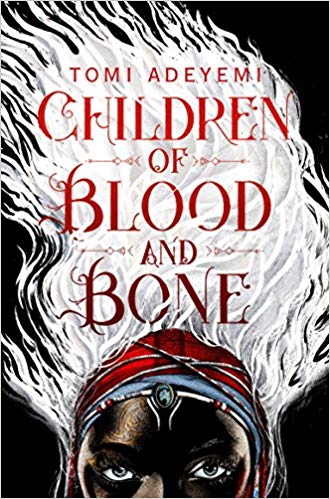Children of Blood and Bone

Children of Blood and Bone is Tomi Adeyemi’s debut novel, released earlier this year. It’s kind of a big deal, critically lauded, sequel in the pipeline, huge film rights deal, etcetera, etcetera. A lot of the praise I’ve seen relates to its use of West African mythology and the manner in which it handles difficult subject matter, and I completely agree, to a point. That point is around two thirds in to the book, for some reason a totally incongruous and probably unnecessary romantic subplot starts (I use the word probably because I’m not privy to where books two and three of a mooted trilogy will take us), between two characters who have previously hated each other. For a not insubstantial period this subplot takes over, and for me this derailed and, to a certain extent, devalued the main themes of the book.
Children of Blood and Bone forces us to consider some of the more depressing facts our own reality, the picture of genocide and related atrocities forced upon the people of Orisha, or rather a group of people deemed to be of lower worth than the rest of the population, is all too familiar. In the case of Orisha the victims of ethnic cleansing were Maji (magic users), victims of The Raid, in which magic was destroyed and all Maji were rounded up by the authorities and killed at the behest of the King. At the time of The Raid, Zelie was a young girl and a Diviner, a Maji not yet come into her/his powers, a bystander as her Mother was led away and her Father beaten for attempting to intervene. The story commences after several years have passed and a now teenage Zelie is living with her Father and Brother. Together they scrape a living as fisher folk in a small coastal village, an ever increasing difficulty as the persecution of Diviners continues.
Amari is the daughter of the King, she has been enduring a more personal level of mistreatment at the hands of her overbearing Father and weak willed Brother. Her closest friend is a Diviner slave with whom she spends most of her time, until the day her father casually kills the slave whilst Amari is spying on him. This death sets off a chain of events which bring Amari and Zelie together and sends them off on a quest to restore magic to Orisha.
Although aimed at a YA audience the writing is mature enough for an adult audience without any feeling of condescension. The narrative may follow a familiar coming of age arc, but there are a lot of original ideas to be found in this work, standard fantasy stereotypes are conspicuous in their absence and replaced with giant African mammals. In conclusion I think that, subplot notwithstanding, the praise that this book is receiving is broadly merited, it’s a bold, evocative and imaginative piece of work.